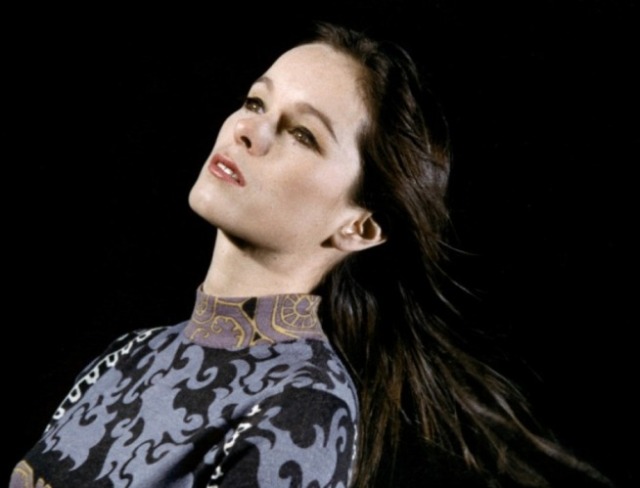
GERALDINE CHAPLIN
Interviewed by Oriana Fallaci (Nov,1964)
Geraldine Chaplin’s film career has been a decidedly hit and miss affair, but of the many (many, many..) Chaplin offspring, she alone managed to carve out some vestige of personal success from beneath her father’s suffocating shadow. In 1964 the deadly Italian viper, Oriana Fallaci, managed to trap the upcoming Chaplin daughter into granting her an interview. Fallaci, who’s acid tongued interview style had prompted Frederico Fellini to call her a ‘Rude little bitch’.. and even managed to ruffle the rather icy feathers of Ingrid Bergman. Her talons sharpened, Miss.Fallaci prepared her verbal weapons to devour this spoilt little upstart.. only to find herself flummoxed by the girl with the ‘sad little clown eyes’, and warming to her endearingly humble personality. It really is a fascinating little interview.. intriguing and refreshingly honest. We can feel Fallaci’s astonishment at her own uncharacteristic shift from celebrity carnivore to sympathetic ear.. before eventually shifting back into gear for one last cutting question.
As an interesting little aside, Geraldine appeared some time later in Robert Altman’s witty critique on the Country Music scene ‘Nashville’, wandering about from scene to scene carrying a tape recorder, interviewing passers by in mock Fallaci hyperbole. It may have been Altman’s idea of course… but I rather think it came from Geraldine, don’t you?
———————————————————-
Oriana Fallaci’s introduction from the ‘Limelighters’ edition of 1967 :
‘On that beautiful face of hers, that ‘from forehead to nose is mother’s face, from nose to chin is father’s’, Geraldine Chaplin has three beauty spots, forming a triangle. One is above her mouth, one below her right eye and one below her left eye. The one above her mouth she manages to conceal, more or less, with make-up, but the ones beneath her eyes, as they are actually adjoining her lashes, they look like two black tears : the motionless, continual, heartrending tears of a little clown. She smiles, and the black tears are still there. She eats, she smokes, she sleeps, and the black tears are still there, to remind her of an unadmitted sadness, the heavy responsibility that nobody envies her : being the daughter of Charlie Chaplin. During our conversation I never took my eyes off those two beauty spots, the two black tears, and even if she hadn’t been so touching, so sincere, they would have been enough to cancel out the scant indulgence with which I had approached her, this twenty-year-old who had everything : charm, beauty, illustrious name, success, easy career. Without so much as raising her little finger, let’s admit it, she has got where other people fail to get after years and years of effort : enough for her to appear doing two or three steps in a ballet, barely a role at all, for the world to fall in love with her and international society to fling wide it’s doors and the cinema to beg her to accept star parts.
But is this really such good fortune? The answer to the question lies in the following interview which took place in Madrid (November,1964) where Geraldine Chaplin was making her first film, ‘Un beau matin d’ete’. Naturally the film has nothing to do with father’s films, indeed goodness knows what father thinks about it, father doesn’t say anything, father’s waiting for her at the finishing tape. As for mother, she says and thinks what father says and thinks, and as a father… father. Father. This incredible exacting, terrifying father, who has as much glory as progeny. My interview with Geraldine Chaplin lasted several hours. Geraldine, who is shy, spoke hesitatingly, bashfully, and whenever she said anything especially serious her voice would become a whisper, trail off into silence. Fade away : I was to have trouble picking it up on the tape-recorder, even with the volume turned up to maximum. Only when I asked her if she feared that father of hers did her answer come loud and sure. And because of what she told me I forgot to ask her the very thing I most wanted to know : Whether she loved him, that father of hers.’
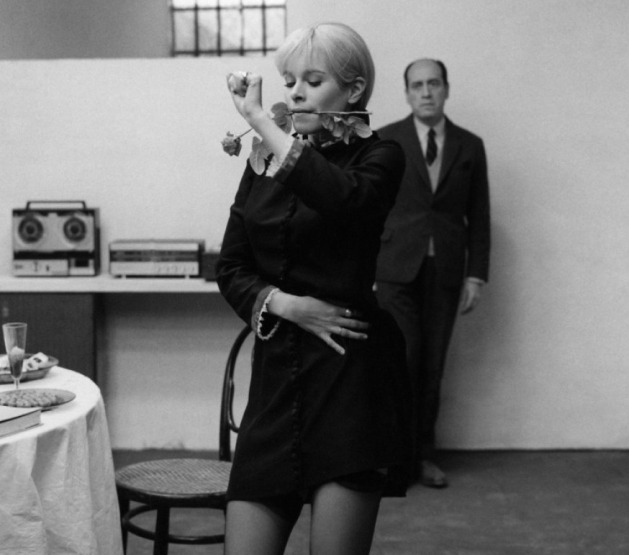
ORIANA FALLACI : No doubt you realize, Geraldine, that this interview is due to a name, a relationship: namely, to the fact that you are Charlie Chaplin’s daughter. This might sound discourteous, perhaps it is. But the curiosity and the interest you arouse everywhere are also due to the same thing: let’s admit it. Leading newspapers spread news about you, famous film directors fight over you, proud countesses court you, and yet it can’t be said that you have so far distinguished yourself by any particular achievement : yours is a typical case of a person who becomes someone before they’ve even done anything and..
GERALDINE CHAPLIN : Done anything?!? Damn all, you mean. Look, I’m twenty: and twenty years might not be many but they aren’t few either : there are many people who by the time they’re twenty have done masses of things, but I’ve done a fat nothing, except be Charlie Chaplin’s daughter. It’s unfair, I know, it’s plain ridiculous. In fact, my father is angry, very angry, and he’s right. For example, take what happened when I first appeared in that ballet, Cinderella. I only had two little parts which each lasted a minute, or less, yet there wasn’t a seat to be had in the theatre, and the papers were full of photographs, everyone wanted to interview me, and it was all so disproportionate, so embarrassing. Goodness knows what people thought. You understand? Every time a ballerina did a solo they took her for me : and down would come the applause. When I finally came forward to do my two or three pirouettes, and it became clear that the little Chaplin girl was only going to do two or three pirouettes, their disappointment hit me like a gust of wind. I felt I could hear them saying well, is that all? I felt mortified, humiliated. I thought they’d picked me because I was good : and now I discovered that they’d picked me for the sake of the publicity that goes with my name.
Such are the problems with inheritance, Geraldine. You yourself admitted it in your rather original remark : ‘A lot of people inherit wealth or a title. I have inherited a surname.’ And when you inherit something you always have to pay duties : the greater the inheritance, the heavier the duties. But still, as well as duties, there are the advantages.
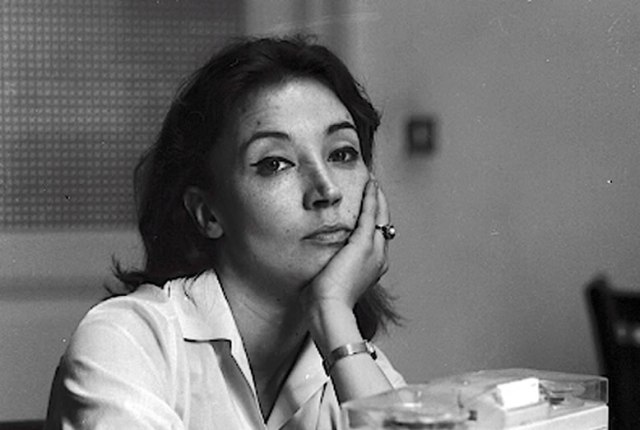
Agreed. And the advantages are remarkable. If you want to start a career, and your name is Chaplin, you don’t have the slightest difficulty getting started. Everyone reveres you. Nonetheless the disadvantages are equally remarkable, believe me. If your name is Chaplin, people expect a lot of you. They expect too much and you must be good, you have to be, if you’re not good they take umbrage, they make fun of you, their respect turns to scorn. But if you are good, they take it for granted and whatever happens you never know whether it’s to your own credit or due to your name. Oh! It’s hateful to think that, if you do make something, it’s just due to your name. It’s hateful to think that, if you fail, you’ll be crushed with shame : because of your name. There are times when I think it would be a lot easier to have an unknown name.
Then why don’t you change your name, Geraldine? A lot of people, in your situation, have changed, do change their name. So why do you use the name?
Because I’m proud of it, obviously : very proud. Because I’m glad to be Charlie Chaplin’s daughter. And also because it would be pointless to change it, it’s too late. By now everyone knows who I am. Everyone recognizes me, apart from the fact that I take so much after my father and mother : I have mother’s face from my forehead to my nose, and father’s from my nose to my chin. Not only that : ever since I was a child I’ve been photographed with them all, and if I called myself Geraldine Smith, you know what people would say? They’d say : Geraldine Smith, Charlie Chaplin’s daughter. The definition of ‘Charlie Chaplin’s daughter’ will follow me all my life, even if I change my name a dozen times. And so, I might just as well go on keeping the name. As Jane Fonda does, for example, Henry Fonda’s daughter ; or Susan Strasberg, Lee Strasberg’s daughter. And I might succeed too : they’ve both succeeded, haven’t they? The only trouble, apart from this positive obligation to succeed, is that you never know whether people give you a contract because they think you’ll succeed or because you’re Chaplin’s daughter.
And you aren’t cynical enough not to care about it, not to excessively hurt by it?
I get so hurt that when they asked me to go for my first screen test I said no. I didn’t want to. Or rather, I tried not to want to. And then I knew that father would be angry, after all he’d already been angry about the ballet hadn’t he? But the offers kept on coming in, pouring in, and the moment came when I couldn’t hold out any more, and now I have at least five films lined up : this one with John Paul Belmondo which I’m doing in Madrid, the next one to be made in Italy by da Risi and written by Zavattini, a fourth which will be Doctor Zhivago, playing opposite Omar Sharif, I don’t even know which part it’ll be, and a fifth to be made with Paramount which will be Anne Boleyn. The part of Anne Boleyn, my God!
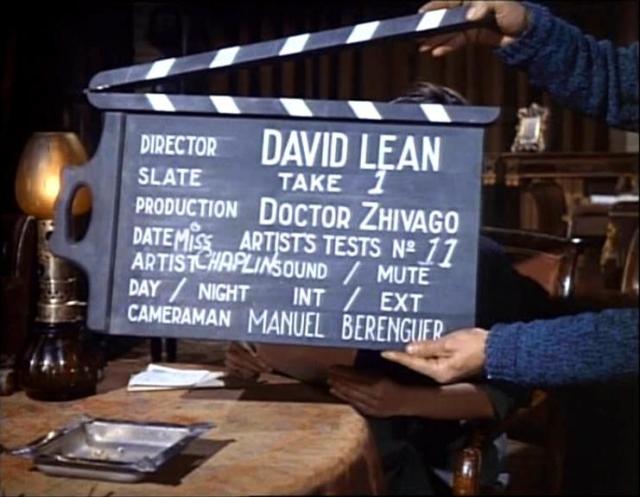
Heavens, Geraldine! To the best of my knowledge, no film star has so many films lined up.
I know. But it’s hard to say no when you’re in demand, even harder when your father happens to be Charlie Chaplin and he keeps saying ‘do something, do something!’ For the sake of doing something I enrolled at the Royal Ballet School in London, I wanted to be a ballerina, I can’t imagine a finer career, and above all my father was happy I should be a ballerina, but I realized that I’d never be a great ballerina and so I might as well give up right away, and try something else. Because you see, it’s not enough to be a good ballerina : you have to be a great ballerina, and this wasn’t the case for me. Firstly I’d started too late, when I was already fifteen, so my technique wasn’t grade one, then, to be honest, I didn’t have the necessary dedication to dance eight hours a day, not to drink, not to smoke, not to eat, to be half nun half robot : and what would have been the outcome? The outcome would have been that I’d have been a disappointment to myself and to father too. I’d have spent my whole life being middling, a member of the corps de ballet, the ones who earn twenty pounds a week, and after all I have to keep myself don’t I?
One question, perhaps indiscreet, Geraldine : didn’t your father help you, isn’t he helping? Would you really have to live on twenty pounds a week and nothing else?
My father paid for my keep when I lived with a family in London, and now he pays or rather he was paying my rent of the flat I’ve been living in since I moved to Paris, But my father thinks that a girl of twenty should support herself, and I think so too. Obviously I could always telephone home and say I’m in a mess, send me a cheque thank you : but I’ve never done it and I never intend to. A while back, for example, I was broke : but really broke. But I didn’t ask them for a thing. Luck came to my rescue. I happened to meet a photographer friend, Willy Rizzo, and Willy said how’s it going, Geraldine? Fine thanks, but I’ve got money problems. So then Willy said why don’t you pose for some fashion photographs, Geraldine? Immediately, thanks : I replied. And so I posed for fashion photographs for four days, a feature that Marie Claire had commissioned Willy to do, and in those four days I earned two thousand francs, a fantastic amount, and so I didn’t ask my father for anything.
They’re offering you crazy sums of money to act in these films. Crazy for a beginner anyway.
My God! For this film I’ve already been given ten per cent and I’ve never seen so much money all at once. It’s even disgusting the amount they pay. When you think that a wretched ballerina works and sweats and breaks her feet for years and years and years to earn in a month what I’m earning in a day! Crazy. I talked about it to my father too ; heavens the money they spend on a film! Father says : true, but more people go to the cinema than to the ballet. Well : it’s still crazy. But that isn’t the point. The point is ; do I deserve it? This isn’t just rhetoric, believe me : it’s pride. Like the business of succeeding. Will I succeed? Will I succeed in making a fool of myself and of my father? My part in this film isn’t difficult, the part of Risi might have been written for me, but the others… Anne Boleyn… my God…and if I don’t succeed…my father. I’d never seen a film camera before I did my screen test, and so I’m going around asking for advice, and some people tell me to study diction, some tell me to study singing, some tell me to study diction and singing, some tell me not to study anything…

And what does your father tell you, Geraldine? It seems to me that no one could help you resolve these kinds of doubts better than him.
He tells me… nothing. That is… not much. It’s true I don’t ask him anything. Not because we aren’t on good terms, the way they say, eh? On the contrary, I go home whenever I can.. we never talk about my career. He doesn’t want to interfere, so much so that I don’t even know what he thinks about my becoming an actress, I think he’s waiting for me at the finishing tape, to judge me… of course if I do fail, I shall face my father and tell him calmly I’ve failed father. But if it really happens..
It won’t happen, Geraldine. You are very beautiful, very photogenic, and you have what it takes to be someone : you have that certain something that spells success. I’m right, you’ll see.. Geralsine, how long has it been since you saw your father?
A long time. I should have seen him in London for the publication of his book but I couldn’t go because Boris, my dog, was sick. I thought he was going to die, my Boris, and so I had to choose between Boris and my father’s book. And I chose Boris. So I don’t even know if father is pleased about this first film of mine. No, father doesn’t come here to Spain. father never sets foot in Spain. And then it isn’t as if i find it very easy to talk to father, to talk about myself, I mean. Not because he’s seventy-five and I’m twenty, I get on well with people of any age, and very young people often irritate me, no, it isn’t a matter of generation, it’s that father is so strict, difficult… But, yes, perhaps age does have something to do with it.
I’d say so. But how about your mother, geraldine? Apart from the fact that your mother is only thirty-nine, it must be easier to have a heart to heart with your mother, isn’t it?
My mother is a saint. Truly : a saint. but I find it very difficult to talk even to her. my mother, you see, is nearer my father’s seventy-five than my twenty. Because, you see, people don’t understand. They don’t know. People say : what about your mother Geraldine? Well, mother tries to keep everything running smoothly, to keep everyone on good terms, but she’s so much in love with my father. People don’t understand, they’ll never believe how, why, such a young, beautiful woman, who could have become a star in her own right, married anyone she wanted, could have fallen in love with a man nearly thirty-seven years older than herself. But that’s how it is. The two of them live in a world of their own, a fairy tale world, a world from which anyone else is excluded and… People just see them. He still courts her like the first days, she still blushes like the first days. It’s even very touching : but one feels shut out. And one thinks… well, one thinks that perhaps it isn’t even worth asking advice. And then I’m shy, like my mother, in fact like my father too, nobody knows that my father is shy. We’re all shy in our family. We love adventure but we blush for nothing and people frighten us. You know that up until a few years ago I used to cry when I had to go into a room full of people? Well, I don’t cry nowadays but I’m still shy just the same because I’ve discovered, you see, that the world is wicked. I’ve always been disappointed in people, and the more important the people, the more I’ve been disappointed. Not that I take it too much to heart though, you know. On the contrary, I’ve learned one important thing about people : that you mustn’t expect to find yourself, a reflection of yourself, in other people : you have to take people for what they are, that is to say different from yourself, always. And then you can accept them, people.
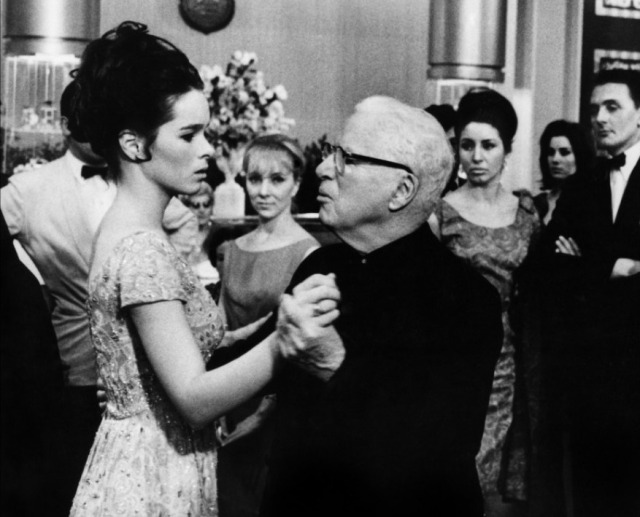
You were a very lonely child weren’t you Geraldine?
Oh, no! You can’t be lonely when you have seven brothers and sisters. And Children have a very happy life in the Chaplin household. They play and laugh and sing and make a lot of noise all the time, and there’s always something going on, an argument, a quarrel… And then mother gives them a lot of her attention, father loves them very much ; children are never unhappy, never lonely in the Chaplin house. Everything’s simple in the Chaplin household, while you’re children. It’s later that things become a bit less simple. It’s later that you begin to think for yourself, see for yourself, decide to leave the nest. And so I’ve left the nest, Michael’s left the nest… I was naturally, the first to leave it. After me it was Michael’s turn and at present he’s studying speech and dramma in London. After Michael it will be Josie’s turn, she’s the beauty of the family, fantastically beautiful, even more beautiful than my mother. Afer Josie it’ll be Vicky, she’s very gifted and she’ll certainly wind up an actress too…
And your parents will be left more and more lonely?
Lonely! My father and mother will never be lonely as long as they both live, and for every child that leaves, another arrives. The last one was born eighteen months ago : but will it be the last? And then they’re so used to seeing us go : as soon as the girls are ten years old, my parents send them to a convent. I went to a convent too. I only left it to go to London, to the ballet school.
To a convent, Geraldine?!? Odd that Charlie Chaplin sends his daughters to a convent. It certainly can’t be said that he has any sympathy with the Church. And why on earth does he send you to a convent?
For the dicipline. My father’s fanatical about disciplin. And I am too : in that respect I’m very much like him. besides I was so wild, when I was ten, that I don’t know what would have happened if the nuns hadn’t brought me up. They were strict, the nuns, as strict as father : but they were so gentle too. And gentleness is so lovely and I’m very happy I spent those years with the nuns. And then the nuns gave me something I didn’t have, they gave me religion and… you see : we Chaplin kids were never baptized into any religion. That’s the way father wanted and wants it. We’ve never heard any talk of God, we’ve never heard a prayer and… well, now I’ll tell you a very silly, a very odd thing. The first day I went into class, all the girls were standing up praying. I didn’t know about praying, you see? …and so I thought they were reciting a lesson. But the second day they stood up again and recited the same lesson again, so I thought, that’s odd, didn’t they say the same lesson yesterday? I turned to one of the girls and asked her : what are you doing? We’re praying, said she. Praying? said I. Yes, praying, said she. Praying to whom? said I. Praying to God, said she. God who? said I. And… silly, eh? Odd.
No. Go on Geraldine.
Well, the girl looked at me in amazement and didn’t say any more. So then, when the lesson was over, I went to the nuns and asked who God was : was he the head of the school? The nuns said yes, God was also the head of the school. So then I asked the nuns if I could meet this head of the school and the nuns replied that this head of the school was very good and was taking care of me, if I spoke to him he would listen and… well, it was like a fairy tale only more beautiful, and I believed it… if I had to choose a religion, I’d choose Catholicism. In fact, sooner or later I will choose it. Sooner or later I shall be baptized. When I’ve overcome all my doubts. I’ve already overcome a great many you know? Oh! You are looking at me in a funny way!
I’m looking at you with sympathy, Geraldine. And with surprise. I’d been told you were spoiled and wilful, superficial and proud, even silly… Tell me about these doubts you have overcome.
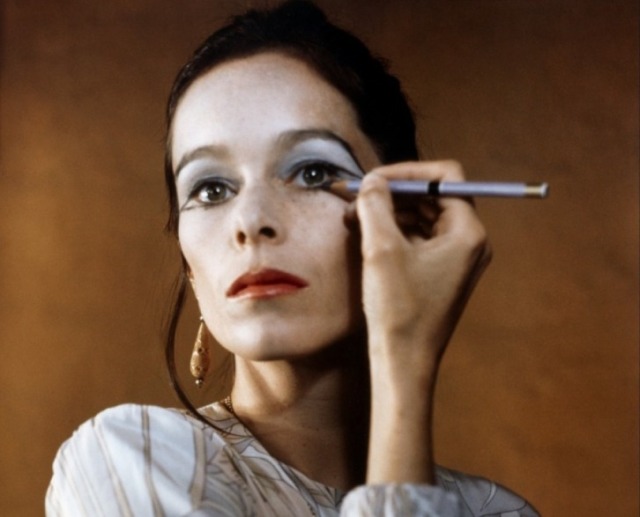
Firstly, snobbery. There’s nothing in the world I hate as much as snobbery. I absolutely cannot understand why people take such interest in countesses, princesses, film stars, millionaires and so on. I absolutely cannot understand why countesses, princesses, film stars, millionaires and so on give themselves such airs. Men like my father, like Picasso, are entitled to give themselves airs : but those idiots who haven’t done a thing apart from possessing a title or millions of dollars! Bah! Oh, I know what you’re thinking now. You’re thinking then why, Geraldine, do you go to their cocktail parties? Look : I hardly ever go and then only to take someone with me they don’t like, and to be rude and nosy and annoy them. All right, you say, but you’ve let yourself be adopted by these people, Geraldine. Why did you let them adopt you? For fun, of course. I had no end of fun at the debutants’ ball they gave in Seville. They had me there for much the same reason as you’d hang up an advertising sign and… my God! I’ve never laughed so much in my life. I couldn’t bear to look at myself in the mirror, I looked grotesque. Dressed all in white, in a magnificent gown by Castillo, and my hair done by what’s-his-name, Alexandre… I looked like a high class French poodle… I’ll never be one of them.. I don’t want to be a powder puff for countesses and snobs.
I’m going to ask.. and I beg you to answer me sincerely because, I believe, it’s a very important question. A question that, obviously, concerns your father. This, Geraldine : are you afraid of him?
Certainly I’m afraid of my father… Certainly. Very, very afraid. And not only because he’s so unbending, so difficult, so strict. Not only because he always turns out to be right in the end, whatever he says or does. But because… because… how can I put it… I feel… yes, I feel that only when I’m no longer in his shadow all the time… like all of us. And I feel… yes, I feel that only when I’m no longer in his shadow, when I’m no longer afraid of him, that only then will I be able to do something myself.
——————————————————–
-MADRID, NOVEMBER 1964-
‘Limelighters’ by Oriana Fallaci -trans. Pamela Swinglehurst- Northumberland Press, London, 1967 (other interviews in this edition include : Ingrid Bergman, Fellini, Jeanne Moreau, Hitchcock, Arletty, Sammy davis Jr., Anna Magnani & Sean Connery)


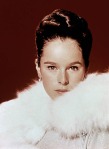

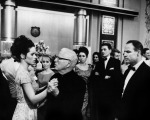
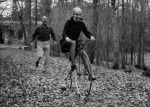

please consider linking my new biography of Chaplin (just published):
http://www.chaplinalife.com
Thanks
Steve Weissman
Washington, DC
PS I forgot to mention: Geraldine Chaplin wrote the introduction to this book
Certainly Steve. What an interesting perspective to approach a Chaplin biography from. I’ll pop by your site for a read and ponder session. Did you meet Miss.Chaplin? How wonderful.
geraldine is beautiful inside and out!
I gave Geraldine my seat on a crowded Swiss train, coming out of Lausanne in 1959 or 1960 when we were both very young. She radiated sincerity even then.
Ah, fascinating to hear, Eliot. Please do elaborate further.. I’d love to hear more, Sir.